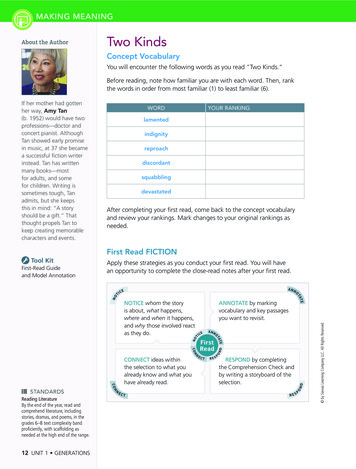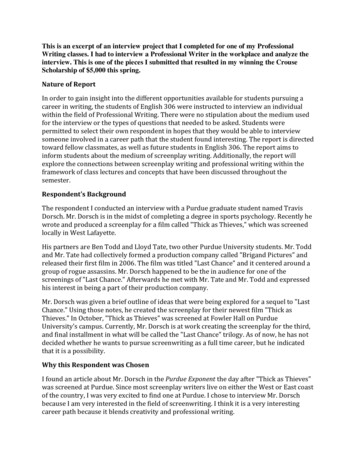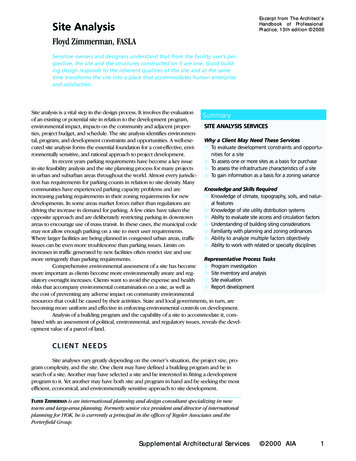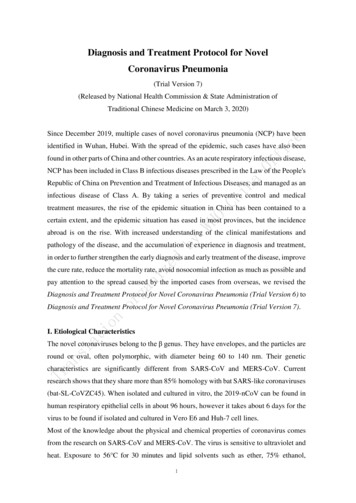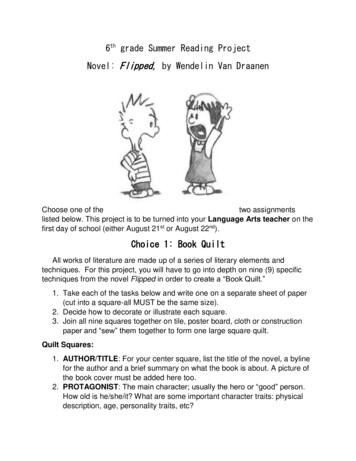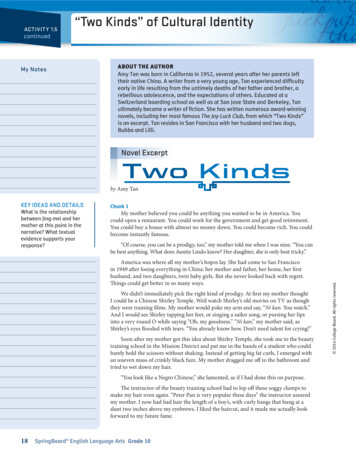
Transcription
ACTIVITY 1.5“Two Kinds” of Cultural IdentitycontinuedMy NotesAbout the AuthorAmy Tan was born in California in 1952, several years after her parents lefttheir native China. A writer from a very young age, Tan experienced difficultyearly in life resulting from the untimely deaths of her father and brother, arebellious adolescence, and the expectations of others. Educated at aSwitzerland boarding school as well as at San Jose State and Berkeley, Tanultimately became a writer of fiction. She has written numerous award-winningnovels, including her most famous The Joy Luck Club, from which “Two Kinds”is an excerpt. Tan resides in San Francisco with her husband and two dogs,Bubba and Lilli.Novel ExcerptTwo Kindsby Amy TanWhat is the relationshipbetween Jing-mei and hermother at this point in thenarrative? What textualevidence supports yourresponse?Chunk 1My mother believed you could be anything you wanted to be in America. Youcould open a restaurant. You could work for the government and get good retirement.You could buy a house with almost no money down. You could become rich. You couldbecome instantly famous.“Of course, you can be a prodigy, too,” my mother told me when I was nine. “You canbe best anything. What does Auntie Lindo know? Her daughter, she is only best tricky.”America was where all my mother’s hopes lay. She had come to San Franciscoin 1949 after losing everything in China: her mother and father, her home, her firsthusband, and two daughters, twin baby girls. But she never looked back with regret.Things could get better in so many ways.We didn’t immediately pick the right kind of prodigy. At first my mother thoughtI could be a Chinese Shirley Temple. We’d watch Shirley’s old movies on TV as thoughthey were training films. My mother would poke my arm and say, “Ni kan. You watch.”And I would see Shirley tapping her feet, or singing a sailor song, or pursing her lipsinto a very round O while saying “Oh, my goodness.” “Ni kan,” my mother said, asShirley’s eyes flooded with tears. “You already know how. Don’t need talent for crying!”Soon after my mother got this idea about Shirley Temple, she took me to the beautytraining school in the Mission District and put me in the hands of a student who couldbarely hold the scissors without shaking. Instead of getting big fat curls, I emerged withan uneven mass of crinkly black fuzz. My mother dragged me off to the bathroom andtried to wet down my hair.“You look like a Negro Chinese,” she lamented, as if I had done this on purpose.The instructor of the beauty training school had to lop off these soggy clumps tomake my hair even again. “Peter Pan is very popular these days” the instructor assuredmy mother. I now had bad hair the length of a boy’s, with curly bangs that hung at aslant two inches above my eyebrows. I liked the haircut, and it made me actually lookforward to my future fame.18SpringBoard English Language Arts Grade 10 2014 College Board. All rights reserved.Key ideas and details
ACTIVITY 1.5continuedIn fact, in the beginning I was just as excited as my mother, maybe even more so.I pictured this prodigy part of me as many different images, and I tried each one onfor size. I was a dainty ballerina girl standing by the curtain, waiting to hear the musicthat would send me floating on my tiptoes. I was like the Christ child lifted out of thestraw manger, crying with holy indignity. I was Cinderella stepping from her pumpkincarriage with sparkly cartoon music filling the air.My NotesIn all of my imaginings I was filled with a sense that I would soon become perfect:My mother and father would adore me. I would be beyond reproach. I would never feelthe need to sulk, or to clamor for anything. But sometimes the prodigy in me becameimpatient. “If you don’t hurry up and get me out of here, I’m disappearing for good,” itwarned. “And then you’ll always be nothing.”Chunk 2Every night after dinner my mother and I would sit at the Formica topped kitchentable. She would present new tests, taking her examples from stories of amazingchildren that she read in Ripley’s Believe It or Not or Good Housekeeping, Reader’s Digest,or any of a dozen other magazines she kept in a pile in our bathroom. My mothergot these magazines from people whose houses she cleaned. And since she cleanedmany houses each week, we had a great assortment. She would look through them all,searching for stories about remarkable children.The first night she brought out a story about a three-year-old boy who knewthe capitals of all the states and even most of the European countries. A teacher wasquoted as saying that the little boy could also pronounce the names of the foreign citiescorrectly. “What’s the capital of Finland?” my mother asked me, looking at the story. 2014 College Board. All rights reserved.All I knew was the capital of California, because Sacramento was the name of thestreet we lived on in Chinatown. “Nairobi!” I guessed, saying the most foreign word Icould think of. She checked to see if that might be one way to pronounce Helsinki beforeshowing me the answer.Key ideas and detailsHow does Jing-mei’sperspective change in thissection? What explains thischange?The tests got harder—multiplying numbers in my head, finding the queen of hearts ina deck of cards, trying to stand on my head without using my hands, predicting the dailytemperatures in Los Angeles, New York, and London. One night I had to look at a page fromthe Bible for three minutes and then report everything I could remember. “Now Jehoshaphathad riches and honor in abundance and that’s all I remember, Ma,” I said.And after seeing, once again, my mother’s disappointed face, something insideme began to die. I hated the tests, the raised hopes and failed expectations. Beforegoing to bed that night I looked in the mirror above the bathroom sink, and I sawonly my face staring back—and understood that it would always be this ordinaryface—I began to cry. Such a sad, ugly girl! I made high-pitched noises like a crazedanimal, trying to scratch out the face in the mirror.And then I saw what seemed to be the prodigy side of me—a face I had neverseen before. I looked at my reflection, blinking so that I could see more clearly. The girlstaring back at me was angry, powerful. She and I were the same. I had new thoughts,willful thoughts—or, rather, thoughts filled with lots of won’ts. I won’t let her changeme, I promised myself. I won’t be what I’m not.So now when my mother presented her tests, I performed listlessly, my headpropped on one arm. I pretended to be bored. And I was. I got so bored that I startedcounting the bellows of the foghorns out on the bay while my mother drilled me inother areas. The sound was comforting and reminded me of the cow jumping over themoon. And the next day I played a game with myself, seeing if my mother would giveup on me before eight bellows. After a while I usually counted only one bellow, maybetwo at most. At last she was beginning to give up hope.Unit 1 Cultural Conversations19
ACTIVITY 1.5“Two Kinds” of Cultural IdentitycontinuedChunk 3GRAMMAR USAGESyntaxNotice the arrangementof words in the sentencesbeginning with “She gotup ” through the rest of theparagraph. What effect do theshort, abrupt sentences haveon your perception of themother?My NotesTwo or three months went by without any mention of mybeing a prodigy. And then one day my mother was watching theEd Sullivan Show on TV. The TV was old and the sound keptshorting out. Every time my mother got halfway up from the sofato adjust the set, the sound would come back on and Sullivanwould be talking. As soon as she sat down, Sullivan would go silentagain. She got up—the TV broke into loud piano music. She satdown—silence. Up and down, back and forth, quiet and loud. Itwas like a stiff, embraceless dance between her and the TV set.Finally, she stood by the set with her hand on the sound dial.She seemed entranced by the music, a frenzied little piano piece with amesmerizing quality, which alternated between quick, playful passages and teasing,lilting ones.“Ni kan,” my mother said, calling me over with hurried hand gestures. “Look here.”I could see why my mother was fascinated by the music. It was being pounded outby a little Chinese girl, about nine years old, with a Peter Pan haircut. The girl had thesauciness of a Shirley Temple. She was proudly modest, like a proper Chinese Child.And she also did a fancy sweep of a curtsy, so that the fluffy skirt of her white dresscascaded to the floor like petals of a large carnation.In spite of these warning signs, I wasn’t worried. Our family had no piano and wecouldn’t afford to buy one, let alone reams of sheet music and piano lessons. So I couldbe generous in my comments when my mother badmouthed the little girl on TV.“Play note right, but doesn’t sound good!” my mother complained. “No singingsound.”What conflicts are apparent inthis conversation? What arethe reasons for the conflicts?“Just like you,” she said. “Not the best. Because you not trying.” She gave a little huffas she let go of the sound dial and sat down on the sofa.The little Chinese girl sat down also, to play an encore of “Anitra’s Tanz,” by Grieg.I remember the song, because later on I had to learn how to play it.Three days after watching the Ed Sullivan Show my mother told me what myschedule would be for piano lessons and piano practice. She had talked to Mr. Chong,who lived on the first floor of our apartment building. Mr. Chong was a retired pianoteacher, and my mother had traded housecleaning services for weekly lessons and apiano for me to practice on every day, two hours a day, from four until six.When my mother told me this, I felt as though I had been sent to hell. I whined,and then kicked my foot a little when I couldn’t stand it anymore.“Why don’t you like me the way I am?” I cried. “I’m not a genius! I can’t play thepiano. And even if I could, I wouldn’t go on TV if you paid me a million dollars!”My mother slapped me. “Who ask you to be genius?” she shouted. “Only ask yoube your best. For you sake. You think I want you to be genius? Hnnh! What for! Whoask you!”“So ungrateful,” I heard her mutter in Chinese, “If she had as much talent as she hastemper, she’d be famous now.”20SpringBoard English Language Arts Grade 10 2014 College Board. All rights reserved.Key ideas and details“What are you picking on her for?” I said carelessly. “She’s pretty good. Maybe she’snot the best, but she’s trying hard.” I knew almost immediately that I would be sorry Ihad said that.
ACTIVITY 1.5continuedChunk 4Mr. Chong, whom I secretly nicknamed Old Chong, was very strange, alwaystapping his fingers to the silent music of an invisible orchestra. He looked ancient in myeyes. He had lost most of the hair on the top of his head, and he wore thick glasses andhad eyes that always looked tired. But he must have been younger than I thought, sincehe lived with his mother and was not yet married.I met Old Lady Chong once, and that was enough. She had a peculiar smell, like ababy that had done something in its pants, and her fingers felt like a dead person’s, likean old peach I once found in the back of the refrigerator: its skin just slid off the fleshwhen I picked it up.I soon found out why Old Chong had retired from teaching piano. He was deaf.“Like Beethoven!” he shouted to me: We’re both listening only in our head!” And hewould start to conduct his frantic silent sonatas.Our lessons went like this. He would open the book and point to different things,explaining their purpose: “Key! Treble! Bass! No sharps or flats! So this is C major!Listen now and play after me!”And then he would play the C scale a few times, a simple chord, and then, as ifinspired by an old unreachable itch, he would gradually add more notes and runningtrills and a pounding bass until the music was really something quite grand. 2014 College Board. All rights reserved.I would play after him, the simple scale, the simple chord, and then just playsome nonsense that sounded like a rat running up and down on top of garbage cans.Old Chong would smile and applaud and say “Very good! But now you must learn tokeep time!”My NotesSo that’s how I discovered that Old Chong’s eyes were too slow to keep up with thewrong notes I was playing. He went through the motions in half time. To help me keeprhythm, he stood behind me and pushed down on my right shoulder for every beat. Hebalanced pennies on top of my wrists so that I would keep them still as I slowly playedscales and arpeggios. He had me curve my hand around an apple and keep that shapewhen playing chords. He marched stiffly to show me how to make each finger dance upand down, staccato, like an obedient little soldier.He taught me all these things, and that was how I also learned I could be lazyand get away with mistakes, lots of mistakes. If I hit the wrong notes because I hadn’tpracticed enough, I never corrected myself, I just kept playing in rhythm. And OldChong kept conducting his own private reverie.So maybe I never really gave myself a fair chance. I did pick up the basics prettyquickly, and I might have become a good pianist at the young age. But I was sodetermined not to try, not to be anybody different, and I learned to play only the mostear-splitting preludes, the most discordant hymns.Over the next year I practiced like this, dutifully in my own way. And then oneday I heard my mother and her friend Lindo Jong both after church, and I was leaningagainst a brick wall, wearing a dress with stiff white petticoats. Auntie Lindo’s daughter,Waverly, who was my age, was standing farther down the wall, about five feet away.We had grown up together and shared all the closeness of two sisters, squabbling overcrayons and dolls. In other words, for the most part, we hated each other. I thought shewas snotty. Waverly Jong had gained a certain amount of fame as “Chinatown’s LittlestChinese Chess Champion.”Key ideas and detailsHow does the relationshipbetw
22.09.2015 · We’d watch Shirley’s old movies on TV as though they were training films. My mother would poke my arm and say, “Ni kan. You watch.” And I would see Shirley tapping her feet, or singing a sailor song, or pursing her lips into a very round O while saying “Oh, my goodness.” “Ni kan,” my mother said, as Shirley’s eyes flooded with tears. “You already know how. Don’t need talent for crying!”
